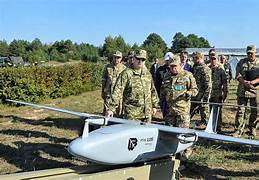Many US media outlets proclaiming "Zelenskyy sacks Zaluzhnyi" or "Zaluzhnyi fired!"
I don't see it that way.
Allow me to provide some context. A 🧵
1/
I don't see it that way.
Allow me to provide some context. A 🧵
1/
https://twitter.com/Gerashchenko_en/status/1755636351364440209
GEN Zaluzhnyi is 51 y.o., extremely young for a Commander of any nation's Armed Forces. Most 4-star generals are in their 60's with much more experience.
Since Feb '22 he's been the tactical, opn'l & strategic leader of the toughest fight we've seen in the 21st century. 2/
Since Feb '22 he's been the tactical, opn'l & strategic leader of the toughest fight we've seen in the 21st century. 2/

Here's what I mean by "tactical, opn'l, strategic" commander:
1. He commands the 2000+ mile tactical front
2. He coordinates each battles into an operational campaign plan
3. He "plays" in the strategic arena with his nation's leaders & over 50 supporting nations. 3/
1. He commands the 2000+ mile tactical front
2. He coordinates each battles into an operational campaign plan
3. He "plays" in the strategic arena with his nation's leaders & over 50 supporting nations. 3/

But that's not all:
1. He started this war without a fully modernized army, as part of a defensive fight...and incorporated hundreds of new pieces of equipment as the UAF modernized
2. He had to ensure the logistics support of all that new "stuff."
4/
1. He started this war without a fully modernized army, as part of a defensive fight...and incorporated hundreds of new pieces of equipment as the UAF modernized
2. He had to ensure the logistics support of all that new "stuff."
4/

He's had to find ways to train his forces - from privates to generals - into the kind of modern fight he has been facing, while simultaneously determining how he could fight effectively with a bevy of modern weapon systems. 5/ 

He's dealt with various personalities and unique nationalities as NATO and the US came together to help him, some offering things he needed, some holding back on things he desperately wanted. 6/ 

Truthfully, he came into this invasion as an inexperienced and untrained senior level commander, and he carried himself as a leader of a great army and an emerging nation.
But - and there's always a but - he likely is physically, emotionally, and intellectually exhausted. 7/
But - and there's always a but - he likely is physically, emotionally, and intellectually exhausted. 7/

Commanders of forces get a few hours sleep each night, and continuously face problems with no solutions.
But he has been masterful in his performance over the last 2+ years, and he'll be studied as a great military leader who excelled during a time of crisis. 8/
But he has been masterful in his performance over the last 2+ years, and he'll be studied as a great military leader who excelled during a time of crisis. 8/

God bless you, General.
It's time for a new commander to take the reins. It's a good call to get some new blood into this next phase of the campaign. 9/
It's time for a new commander to take the reins. It's a good call to get some new blood into this next phase of the campaign. 9/

• • •
Missing some Tweet in this thread? You can try to
force a refresh















